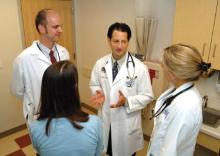Dr. Daniel P. Alford stumbled into addiction medicine after he finished his residency in internal medicine more than a decade ago.
He hesitantly took a part-time position as the medical director for a city-run methadone maintenance program and ended up staying for 10 years. "I loved it the minute I got there," he said.
"I realized that there’s a whole other world out there in terms of addiction treatment that I wasn’t exposed to. Generalist disciplines ... get exposed to the most severe forms of the problem, but when I got to the methadone maintenance program, I met all these patients who were doing great. Their problem was being treated with medication and counseling," he said.
Today, he’s the director for the addiction medicine residency program at Boston University, which is 1 of 10 training programs in the country that have recently become accredited by the American Board of Addiction Medicine (ABAM). One of his goals now is to eliminate the stigma that addiction treatment is always a losing proposition.
There’s a big push to educate nonpsychiatrists about the progress of addiction treatment, and one way to do that is by gaining subspecialty recognition, explained Dr. Richard D. Blondell, ABAM’s chairman of the Residency Accreditation Review Committee. The goal is to get an additional 10-15 addiction medicine programs accredited by July 2012 to reach the target 20-25 programs that are required for subspecialty recognition by the American Board of Medical Specialties (ABMS).
"We’re the largest group of physicians that doesn’t have a home," he said. Subspecialty accreditation is a "very important step. The goal is to bring the specialty of addiction medicine under the tent of organized medicine."
Although nonpsychiatrists have practiced addiction medicine for decades and thousands have been certified by ABAM and by the American Society of Addiction Medicine, none of the postresidency training programs has been accredited or recognized by the national bodies, ABMS, or the Accreditation Council for Graduate Medical Education (ACGME).
Dr. Blondell said that part of the reason that addiction medicine hasn’t become a recognized subspecialty is the fact that the field isn’t highly compensated. "So, there aren’t many resources to do all the paperwork. It’s taken us a bit longer, but we’ll get there."
Advocates say that having addiction medicine as a recognized subspecialty will open the door to physicians from various backgrounds to train in the field and will help increase patient access to addiction treatment. In addition, they say having more experts in the field will help educate the physician workforce, reduce the stigma among physicians, and help with existing reimbursement issues.
"In a sense no specialty wanted to claim addiction medicine," said Dr. Peter Friedmann, professor of medicine and community health at Brown University in Providence, R.I., and an ABAM-certified addiction medicine specialist. It really is a field that crosses disciplines, and "the establishment of residency really sets the wheels in motion to have specialists in medical centers and in communities recognized for this particular expertise. It also brings a level of legitimacy, and a certain body of knowledge that is important for all physicians to know and to integrate into their practices."
The American Academy of Addiction Psychiatry (AAAP) in concert with the American Psychiatric Association and other organizations succeeded in getting addiction psychiatry recognized as a subspecialty by the American Board of Psychiatry and Neurology (an ABMS member), and Addiction Psychiatry fellowships by the ACGME in the early 1990s. The majority of addiction psychiatry programs, however, accept psychiatry residents only.
"We’ve been supporting the ability of nonpsychiatrists to get postresidency training in addiction for a long time," said Dr. Richard Rosenthal, past president of AAAP and the current head of public policy at the association. "We’re glad that there’s finally a mechanism to get extra training for primary care doctors and others."
Dr. Rosenthal said he expects that there will be growing pains and tension between the two subspecialties, which overlap in many areas. "But my attitude is that given the patient density, there’s more than enough pie to go around. More and more we have to look at building care teams that address the broad array of medical problems," said Dr. Rosenthal.
In a 2009 report, the American Board of Addiction Medicine Foundation, which accredited the addiction medicine programs this year, estimated that 5,000 new physicians need to be certified by 2020 to meet demand.

